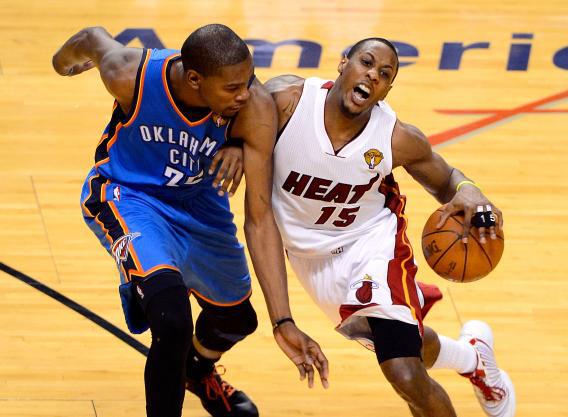Oklahoma City’s Serge Ibaka picked up his second foul just 4:44 into the Thunder’s Game 4 loss in the NBA Finals. Oklahoma City coach Scott Brooks immediately subbed him out, presumably to spare Ibaka from the purgatory of late-game “foul trouble.” In OKC’s Game 3 loss, Brooks likewise removed his star Kevin Durant when he picked up his fourth foul with 5:41 to go in the third quarter—the Heat took advantage of Durant’s absence to go on a huge run that put them in the lead. In Game 2, however, Brooks allowed Durant to play on after he was whistled for his fifth foul with 10:30 to go in the game. In that game, the Thunder were down by 11 when Durant got his fifth foul and ended up losing by four.
Neither Ibaka nor Durant ended up fouling out in any of these games. So, what were the right moves for Scott Brooks—should he have benched these guys or let them stay on the floor and risk getting more fouls?
NBA statheads have reasoned for years that it doesn’t matter when a player plays as long as he maximizes his court time. In Tobias Moskowitz and Jon Wertheim’s 2011 book Scorecasting, the writers note that coaches are too risk-averse when it comes to foul trouble. After reaching five fouls, Moskowitz and Wertheim explain, players only receive a disqualifying sixth foul 21 percent of the time, and that even then, it’s usually not too long before the final buzzer. Their book also disproves the myth that teams perform worse when foul-troubled players are on the court. The assumption that these players might cost their teams by being more tentative in potentially foul-drawing situations turns out to be incorrect. Another study points out that it’s actually success in the third quarter that correlates to the most wins.
But not so fast—a paper published earlier this year by three researchers at NYU argues that coaches who bench foul-laden players are acting rationally. Allan Maymin, Philip Maymin, and Eugene Shen say that foul-plagued players are indeed on-court liabilities. They also show a correlation between winning and adhering to the “Q+1” benching rule—benching a player when he gets a second foul in the first quarter, a third foul in the second quarter, a fourth foul in the third quarter, or a fifth foul in the fourth quarter. (According to the NYU researchers, coaches pull players more than 70 percent of the time in the immediate aftermath of reaching that Q+1 threshold.)
In order to believe the NYU study, however, you need to believe that late-game points are more valuable than baskets scored earlier. That notion is based on the principle that there are still many possessions remaining in the beginning of a game—it’s not until the waning moments that a basket either way is likely to swing a team’s win probability drastically. But this concept, which has been labeled “leverage” in sabermetric baseball circles, ignores the fact that the presence or absence of late-game, high-leverage situations is determined by the actions that preceded them. Sure, you’d love to have your best players on the court when the game’s tied with 10 seconds to go. But those occurrences are rarer than you might think, and you might end up losing by 20 points if you pull a star player in the hope that he’ll be able to come off the bench and rescue you at the end.
The NYU study’s numbers are also largely influenced by an underlying assumption that players are independent production units. But anyone who’s watched basketball can tell you that, for instance, Kevin Love’s scoring jumps when he has Ricky Rubio passing him the ball. Unlike baseball, which is essentially a summation of one-on-one performances, basketball is a fluid game that depends on five complimentary players. It’s for those reasons that certain lineups are selected—and why those lineups should be kept together on court as much as possible. If Kevin Durant, Russell Westbrook, and Serge Ibaka get in foul trouble in Game 5 of the Finals, Scott Brooks should not only not think twice about keeping them on the floor, he should urge them to keep their feet on the gas pedal.
